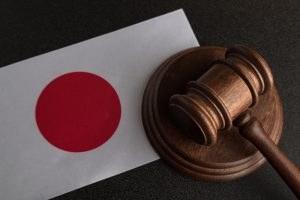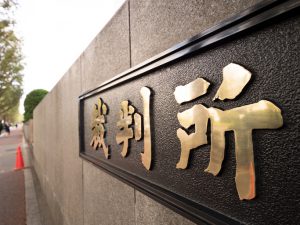Judges and ADR in Japan by Rieko Nishikawa, Professor in Keio University
Keio University 1.Introduction The purpose of this paper is to consider the role of Judges in ADR and their perspectives toward the ADR in Japan. Since Japan has integrated the mediation as one part of the court procedure, the role of the mediation is very important within the Japanese judicial system. The point is that the judges participate in these procedures as one of the mediator or the conciliator when they recommend the conciliation during the litigation. Therefore, before going into the details, the reporter will explain the Japanese court system and the position of the judges.
2. Court and the Judges The highest court in Japan is the Supreme Court. Below that, there are eight Courts of Appeals, and the local courts and the family courts, which means Japan has the three tier court system. In each prefecture, there are one local court and one family court. Under the local court, there is the summary court. The judges of the local courts and above are appointed by the Supreme Court except the Supreme Court Justices. The judges in each court will be transferred to a different district every three years. Therefore, they may leave the case before it comes to the conclusion. One of the reasons of this system is to avoid the strong attachment between the local people and judges, because the very close relationship may impair the neutrality of the judges. Therefore, judges are not familiar with the local custom and culture.
3. ADR in Japan When we discuss about the ADR, the main focus usually will be on arbitration. However, in Japan Mediation and Conciliation process occur routinely at court. Therefore, these two shall be the center of the focus.
1. Conciliation in the Judicial System: Conciliation itself is the most informal method to solve the conflicts. It does not require any formality or the influence from the third parties. In fact, under the Japanese legal system, conciliation is defined as one of the so-called typical contracts. In Japanese practice, there are two types of conciliation. One is the conciliation outside of the court. The other is conciliation within the court. The judges in the any level of the courts can recommend the conciliation to the parties and it is a general practice in Japan. In the both occasions, the final agreement, i.e. the conciliation contract, shall be treated as a usual contract. If, though, it is the conciliation in the court, the final agreement shall be enforceable without further legal proceedings. In these circumstances, the judges are acting as a conciliator. Judges usually suggest the possibility of the conclusion and suggest and urge the parties to reach some agreement following the guidance given by the judges. If the parties agree, then, the agreement will be reduced to the conciliation contract at the court and it is regarded as a final conclusion of the case. Parties will lose the right to appeal. The total number of the cases brought to the court in the year of 1998 was about 1000,000. This number includes the petition for the enforcement of the previous judgements and bankruptcy cases. Among them, the percentage of the trials is about 17%. The total number of the cases reached to the end of the procedure in the local court level was 156,683. Among it, the number of the judgement rendered was 79,632. The number of the conciliation at court, on the other hand, 50,102. By comparing these numbers, one can see the popularity of the conciliation in the Japanese court. Since the recommendation of the conciliation by the judge is possible until the Supreme Court judgement, the real number of the conciliation in all should be more. The reason of the popularity of the conciliation in the court is the enforceability of the final decree and the informality of the procedure. The result of the conciliation in the court is enforceable. By registering the final agreement at the court, and without further procedure, the contents of the agreement may be enforced as same as the judgement. The conciliation contract can be nullified if there are any procedural mistakes. However, usually, this seldom happens since the court supervises the conciliation process and the contents of the agreement with regard to its legality and fairness. Therefore, unless there are apparent procedural error in the process, this agreement will be the final solution for the parties.
(2) Mediation Mediation is the conciliation process aided by the mediators. The mediators mitigate the controversies between the parties. The difference from the conciliation above is the existence of the mediators. Mediators can make proposals for the solution of the conflict. However, the mediators do not have the power to decide the cases, which means that the mediators cannot put the end to the controversies if the parties cannot reach the agreement. If that is the case, the parties can begin the normal suit. In Japanese legal system, the mediation is compulsory for the family court cases and the residential lease contract. The parties who seek a legally effective solution but not a trial in the court can bring a case to the mediation process in the local court or the small claims court. The small claims courts in Japan are under the supervision of the local courts. The final decree of the mediation can have the same effect as the judgement in the court. People can have mediation outside of the court. In fact, many administrative organizations have their own conflict solving mediation like mechanism. However, the resolutions of these mechanisms do not have the enforceability at the court. So in this paper, the author will focus on the mediation at the court. Although it is not held in the public, mediation in Japan is integrated into the official judicial process. Mediation processes held at the court are under the supervision of the judges. Since the mediation process is not open to the public, the role of the judges is important to keep the solution adequate in the eyes of law. Therefore, the court is responsible for the adequacy of the final agreement. Mediators are usually lay people, but there are also some attorneys serving as mediators. Here we have to discuss the two different categories of the mediation. They are the family court mediation and the local court and the small claim court mediation. However, before going into the detail, I will focus on the common characteristics of the mediation. To proceed the mediation, the court appoints the mediation committee that is consisted from one judge and two mediators. These three people will take responsibility for the case. The basic procedure for the mediation is the same in the Family Court and the Normal Court. The mediators are part time civil servant. The local courts employ them. Therefore, they will handle the cases under the jurisdiction of the local court. In other words, each family court and local court owns its own list of mediators. However, the power to appoint the mediators belongs to the Supreme Court. The Supreme Court appoints the mediators from the list of the applicants selected by the local courts. The candidates shall be over 40 of age and have high moral standard with experience and the integrity. Many of the cases, they tend to be the highly respected people within the local community. The mediation agreement will be enforced as same as the judgement. Mediation agreements can be characterized as a kind of the judgement. The difference is the result of the mediation creates the new rights and the legal relationship among the related people to the controversy. On the other hand, the judgement in the court is the declaration of the rights between the parties and does not have the power to create the new legal relationship.
(i) Mediation in the Local Court and the Small Claims Court The number of the mediation brought to the court in 1998 is about 300,000. Comparing this number to the number of the litigation in the normal courts (180,177) and the small claims courts (317,854), one can see the importance of the mediation in Japan. Since the filing fee and other procedural costs are much less to compare to the litigation, the accessibility to the court by the poor people increases. One needs not to have an attorney to file the mediation. The court provides as much help as possible to file the petition. Success rate of the mediation is around 48% of the petitions. This is the number of the cases finished with the final documents. However, there are cases withdrawn with the amicable agreement. So the affectivity of the process can be said quite high. Mediation covers all the civil matters. Therefore, one can file the mediation for any kind of disputes. Historically, the Agricultural Mediation and the Mining Nuisance Mediation had the separate law but now it is integrated into the Law of Mediation. Mediation process is particularly useful for the lease contract of the real property. Particularly with the cases of rent change, the pre-trial mediation is compulsory. Mediation is considered suitable for the case related to the on going relationship between the parties.
(ii) Mediation in the Family Court Mediation is the prerequisite for the litigation of the family matters. Whether it needs the declaration of some kind such as paternity, still parties have to go through the mediation. It is not really appropriate to bring the family matters to the trial at the open court like other civil controversies in the sense of the Japanese. Therefore, in many ways, the family court mediation has a very important role in this area. Family Court can correspond to the particular needs of the parties sometime. This is because the decisions for the family matters cannot really be the final. Even for the couple divorced, if they have children, the divorce is not the end of the story. As the children grow, they may need the different relationship with the person who does not have their custody. For example, in one divorce case, the custody of the children was given to the mother. Their father got the visitation rights and the responsibility to pay the child support. A few years later, the boy got in his teens, and needed the paternal figure. They brought the case again to the family court to award the boy’s custody to the father. In the matrimonial case, a couple may decide not to divorce as the result of the mediation at the first instance, but they may want divorce later. The family matters are going concern. However, litigation put the final end to the controversies. The trial process requires the confrontation. It may not be desirable for the parties in the family problems. It is said that the private rights changes every minute, so the litigation can only decide the status and the condition of the right at one precise moment. It is true, but still normal economic deal can have the final end without any remnants. The people involved in the ordinary civil actions may never see each other. However, the people in the family cases cannot leave the incident completely behind. In the succession case, the division of the legacy may be decided but it is not the end of the brother-sister relationship. In these instances, the consensus among the parties may be more important for the involved members than the final decree by the court to keep the relationship based on love and the blood tie. On the side of the family court, as far as the forum does not change, each local family court can handle these on going controversies with closer care by appointing the former mediators handling the case before to the new petition unless they are vetoed. In the custody case mentioned above, the mediators in the first case and the second instance were the same. So they could see the best interests of the boy in his situation. It was because they knew the parents and the both families built by each parent after the divorce. Also if the parties can have same mediators in the latter case related to the former one, they did not have to bear the pressure of the complicated explanation of the past. In many cases, the people in the second petition related to the former controversies show the approval of having the same arbitrators for they do not have to recite the matters to the mediators in the second case. The success rate of the family court mediation is around 50%. This number indicates the value of the mediation in Japanese society.
4.The Role of Judges and their perspectives to the Mediation (1) Role of the Judges Now, what is the role of the judges in the mediation process? How they perceive their role? It is true that the mediation committee is constituted with two mediators and one judge. Then what is the purpose of having the lay people and the judges together as the mediation committee? One of the purposes of bringing in the lay people into the mediation process is to introduce the common wisdom of the society into the legal process. Sometimes the authority of the court and the judges does not really help people to recognize the true issue of the controversies they have. The authority of the courts tends to intimidate the ordinary people in Japan. Going to the court or to be summoned to the court is a serious problem for the people. The anxiety these people summoned to the court is so great that sometime they refuse to go to the court. One reason of this is that the court is deeply associated with the crime and punishment. We should think that not many of the ordinary people could distinguish the criminal process from the civil process. Some of the people may think that the court will punish the people who break a contract. Under this circumstance, the mediation at the court is the good entrance to those who usually cannot avail themselves to the judicial system. Then what is the role of the judge? Basically, their role is to confirm the legal soundness and the fairness of the final decree of the mediation. To be relied on by the people, mediation must assure the justice and fairness of the conclusion. If the petitioners cannot expect the fair treatment and fair result of the dispute resolution measure, there is no need for them to choose the alternative dispute resolution. And also if the court cannot back up the adequacy and fairness of the process and result of those measures in the court, the procedure does not have to be conducted in the court. Therefore, the responsibility of the judges in the mediation is very important to assure the fairness of the process, the mediators' advice and the conclusion. As for the legality of the conclusion, the final decree shall fulfill the fundamental fairness. Sometimes the final agreement contains the moral provision such as the furtherance of the friendship between the parties. Legally, they do not have much meaning, but it works well for the stabilization of the rights and the relationship between the parties. One of the judges told me the advantage of the mediation process is that the parties themselves have to come to the court. If it is an action at the court, even though it is desirable for the court to have the parties themselves, usually the case is fought between the attorneys representing the parties. However, if it is the mediation, the parties themselves have to come to the court and find their real problems on their own. Of course, they can have the attorneys as an adviser but it is essential for the parties to be there and get to the agreement by themselves. In some of the cases, only one party may have a lawyer. Then Judge will provide necessary legal information for the party who does not have a lawyer. Also judge will keep an eye on the intimidating pressure given by the party with the attorney who is usually a stronger party. One of their roles is to keep the fair balance between the parties. Then how do the judges look at the mediation?
(2) Judges Perspective In many of the civil cases, the litigation and the judgements may not be the best solutions, for these are very much right oriented. However, for example, the creditors’ rights are created by the parties who entered the contract according to their will, which means many of the rights fought in the civil cases are tailored by the parties themselves according to their purpose. Then if it is possible, it is better for them to find the true cause of the problem and solution by themselves rather than to settle the problem with the rigid legal framework by the outsiders. Private autonomy may work better in the case of controversies if somebody can give the adequate help. The fixed pattern of the legal solution may not work for the involved people. These controversies need some flexibility within the boundary of the justice. Often the lay people have better skill in negotiation and conciliation. As the reporter mentioned above, the judges are moving around the country and cannot have a chance to familiarize themselves with the local culture and the customs. Sometimes Judges may be very young and not experienced. The professional judges in Japan often become judges in their late 20s, which means they become judges just after finishing their education. They may have enough legal knowledge, but not the experience in the life. Then the non-legal mediators will fill the inexperience of the judges in life. By combining their knowledge and experience, they can provide the possible best advice to the parties. Here, the role of the judge is not to be the effective mediator but the advisor to the lay mediators about the legal questions and issues. Even if the judges are not so young, the mediators advise about the local custom and the culture will help them to produce adequate and flexible approach to the problems. Whether the problem is one of the domestic or the contract, to perceive the essential underlying problem and the general attitude of the local people will help to address the people involved.
(3) Administration of Justice and Mediation The other advantage for the court to have the mediation system is that they can have a chance to educate the people. As the reporter mentioned above, somehow, going to the court for the ordinary Japanese is not so easy. This fact means the distance between the law and the people. Japanese may highly trust the law and the court, they rarely think their lives are guided by the law from the beginning to the end. They refer their problems to the court only when they cannot settle the matter without outside help. Considering the democratization of the legal system, to fill this gap is essential. The question is how to educate people. The court has a duty to increase their availability to the public to serve the people better. To achieve that, the court has some duty to expand the knowledge about the law and the court among the people. Therefore, having the lay people as mediators is a good chance. The court is responsible to provide the necessary information about the law and the legal procedure to the mediators. For that purpose, they have to provide the orientation and educational programs for the mediators. The expectation of the court and judges are that the mediators will bring the knowledge back to home and pass the information to the people around them. Then the court will be more popular place for the people to ask legal help. There are cases that need a fundamental attention from the society and the court such as the human rights cases. But many of the private cases need the speedy inexpensive and fair solution. By lessening the formality at the court yet with the supervision of the judges, the mediation works well with the Japanese society.
5.Conclusion One of the reasons that mediation is more popular than arbitration in Japan is that the court supports the system. The mediators are selected and appointed by the Supreme Court. The court chooses the people of the high moral standard and integrity in the community. Thus the court confirms the credibility of the mediators. Backed by the authority of the court, people know they can trust the mediation at court. Secondly, the mediation in the court system is a cheap way of the distribution of justice. By eliminating the necessity of the lawyers, and the process of appeals, the cost of the resolution of the conflict can be reduced significantly to compare to the trial in which people cannot do without the lawyers. In the trial, one who can afford the good lawyer may be able to prevail just for that. In many cases, this means that the indigent people receive less justice. However, by providing the process that requires less sophistication of the parties, the judicial system may able to distribute the fairness among the society more widely. The judge will act as the neutralizer and the stabilizer of the power difference between the parties. However, this does not mean the decrease of the necessity of the lawyers. People still need the legal advice. Having the wide range of the dispute resolution system in the society, the lawyers are in the position to help the clients to choose the most adequate measure to solve their problems. It is true that the education at the law faculties in many countries is designed to produce the litigation lawyers. However, it is not the ultimate goal of the legal education. One of the important ability of the lawyers is to perceive the possible result of the problems and the possible conclusion coming out from the every measure they can take and explain them to the clients. The choice of the resolution method shall be in the hand of the clients. The other merit of the mediation is that this process is not open to the public. Court does not have to reveal the contents of the agreement to the public. There are problems, which people do not want to argue in front of the public. However, as I mentioned above, the court has a very important role in mediation. The court has not allowed the unfair solution even in the mediation or conciliation at court. This conviction, I think, comes from the strong sense of the responsibility for the justice of the court and judges. In the modern government system, the role of the court is the guardian of the justice. Therefore, the judges have the strong sense of responsibility not to impair the fundamental justice and fairness. Guarded by this strong sense of justice, judges can utilize the common value in the society through the lay mediators. In one way, mediation at the court can be considered as one method of the democratization of the law. The other aspect of the popularity of the mediation in Japan is its legal effect. The conclusion of mediation has the same enforceability as the judgement. The value of the mediation decree can be quite high. At the same time, the conclusion of the mediation is the results of the parties’ own consensus, not the order from any authority. Private autonomy works with the legal institution in the mediation. The initiative for the resolution comes from parties themselves.
Bibliography Noboru Koyama, Cyusai-ho (Law of Arbitration) Yuhikaku(1983) Noboru Koyama, Minji Chote-ho (Law of Civil Mediation) Yuhikaku (1977) Kojima Takeshi & Ito Makoto, Saibangai Funso Shori-ho (ADR) Yuhikaku (1998) Imai Moriaki, Momegoto Cyote-jutsu (How to Mediate), Gakuyo-Shobo (1993).
____________________________________
- המאמר הועבר לידי דרורה גבע ע"י פרופ' נישיקווה בביקור באוניברסיטת קיאו ביפן.




